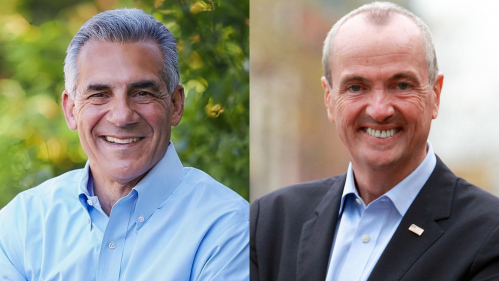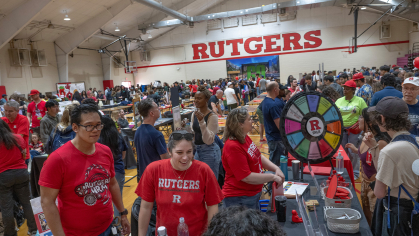Governor’s Race a Nail-Biter, Too Close to Call

Results are still being tallied the day after polls closed in an unexpectedly tight race
New Jersey Democratic Gov. Phil Murphy and Republican challenger Jack Ciattarelli remain in a tight race Wednesday following a long night of surprises for New Jersey residents and Democrats across the country. While registered Democratic voters outnumber Republicans in New Jersey by more than a million, according to the New Jersey secretary of state’s office, neither candidate has been declared a winner as votes from Tuesday's election are still being tallied.
Gov. Murphy would be the first Democratic governor to win reelection in New Jersey in four decades. Kristoffer Shields, historian and program manager at the Rutgers-Eagleton Center on the American Governor, discusses the election and what we might see next.
Why didn't the political strategists see such a tight race?
Incumbents generally have an advantage in gubernatorial races. New Jersey has significantly more registered Democrats than Republicans and Gov. Murphy has generally received positive ratings for his pandemic response. I think most pundits felt that these factors, combined, would make it very difficult for Republican challenger Jack Ciattarelli to force a close race. But it appears pundits underestimated the enthusiasm of Republican voters in the state, the extent to which voters are ready to move on from the pandemic (whether the pandemic itself is ready to move on or not), and the effectiveness of the Ciattarelli campaign's focus on taxes. The result is a much closer race than most expected.

What are some of the factors behind the tighter than expected election?
It is clear that there was a motivated Republican base in New Jersey this year and that the Democratic base was less motivated. That is indeed likely due in part to pandemic fatigue as well as a reaction to what has been happening (or not happening) in Washington. It is also common in the year after a presidential election for there to be a bit of a "hangover effect" for the party that won the presidency. For example, New Jersey is one of only two states (Virginia, of course, is the other) to hold its gubernatorial election the year after a presidential election and in both the historical trend is that the party that won the presidency loses the gubernatorial the next year. In New Jersey, this has been true for every governor's race since 1985 up until possibly this year--we'll have to wait for final results to see.
Are we less blue than we think we are in New Jersey?
New Jersey has long been less blue on the state level than it is in presidential or U.S. Senate contests. Gov. Murphy is attempting to become the first Democratic governor of New Jersey to win reelection since Brendan Byrne in 1977. In that same time period, we have had three two-term Republican governors. So there is a history of Republicans being successful at the state level in New Jersey. That said, I think the prevailing assumption was that New Jersey was trending more and more blue and this year's results are a reminder that there are still Republicans in New Jersey and that they can still win, especially at the state level.
Could the Garden State see a possible recount and what might that look like?
A recount is a definite possibility, if not a probability, depending on the final vote totals. There is no provision for an automatic recount in New Jersey, so the request would have to come from the candidate who is behind or from a group of voters and would need to come within 17 days of the election. The last recount in a governor's race in New Jersey was in 1981, when Tom Kean edged Jim Florio by just over 1,700 votes. In that race, the post-recount winner was not declared until Dec. 2.


